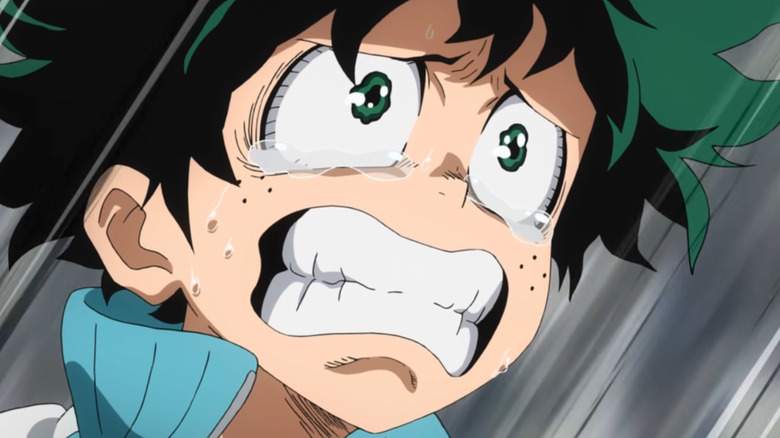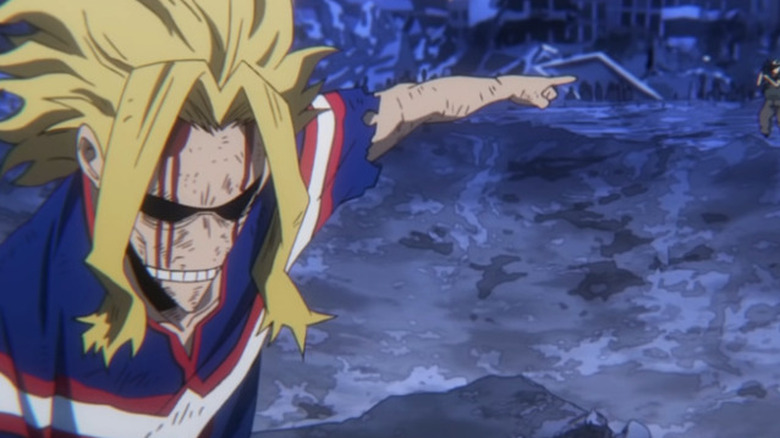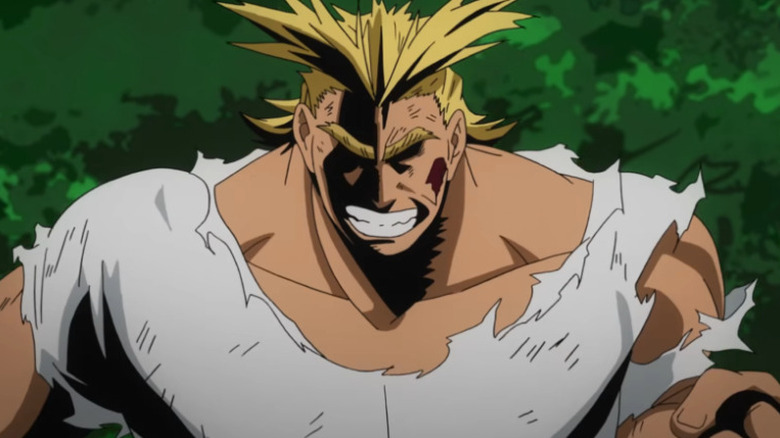My Hero Academia Director Draws A Distinction Between The Manga And American Superhero Comics
Kohei Horikoshi's "My Hero Academia" is a series that follows a lot from the blueprint of the Shonen genre. Usually, the central premise of a Shonen involves a young man seeking to achieve his dream and become the absolute best at what he does. And along the way, mentors, friends, and rivals are discovered during the journey. It's a formula that's served as the solid base for many other series within "Shonen Jump," and "My Hero Academia" is no different. The main character, Izuku 'Deku' Midoriya, is on a quest to become his world's greatest hero, guided by his teacher, All Might, and helped along with his classmates at U.A. High School.
Yet, its unique setting and characters catapult "My Hero Academia" beyond some of its peers. Deku starts the series powerless in a world where nearly everyone has some special ability. It's also a world with an intriguing system of superheroes and villains that honestly wouldn't feel out of place in the DC Universe or the MCU. "My Hero Academia" is brimming with tons of powered crusaders and dastardly threats easily capable of saving or wiping out entire cities. So, it's easy to see numerous parallels between "MHA" and American superhero comics. However, the anime's director, Kenji Nagasaki, could also draw a significant distinction between the series and the superhero comics that inspired it.
My Hero Academia isn't like a typical comic book story
In Episode 49 of "My Hero Academia," All Might has a decisive and intense battle with the villain All For One. It's one of the anime's best fights as All Might grapples with saving citizens and defeating All For One while gradually losing his powers. With the cheering of onlookers and remembering his teacher's words, All Might pushes well beyond his limits. But the cost of his win is the loss of his powers. We've witnessed many stories of heroes sacrificing themselves for the greater good within the pages of American comic books. And "MHA" has its share.
Still, as "MHA" anime director Kenji Nagasaki once told Anime News Network, where "MHA" differs is in its characters' goals. The main cast isn't just trying to save the day. They're aiming more to save themselves and become their best. All of this combines with its American influences to create something original. "With including all these different characters, it's more of a journey for each character to become their own hero, so in that sense, it's very Japanese Shonen," Nagasaki said to Anime News Network. "The mashing together creates something special for this anime and manga. In a sense, it does have American comic book heroes, but with the Japanese flavor."
The more Shonen part of Episode 49 best supports Nagasaki's words. In his weakened state, All Might points outs to a news camera, saying, "Next, it's your turn," which his student, Deku, interprets as a message for the next generation of heroes. In other words, All Might calls for the new batch of young hopefuls to step up and become the heroes they always dreamed of being.
The iconic superhero that inspired All Might
"My Hero Academia" may do its best to keep up the Shonen portion of its DNA. But there's no denying how much of a love letter the series feels like for superhero comic books. The prime example of this is All Might, whose heroic muscular design and trademark attacks initially suggest he's your typical American superhero. After all, it's hard not to think that when his ultimate attack is called "United States of Smash." Despite his moves and looks, All Might isn't from overseas. His real name is Toshinori Yagi, and he's from Japan. So why does All Might appear as the most obviously inspired American superhero? According to the series creator Kohei Horikoshi, it's really because the most iconic comic book superhero inspired All Might's persona and look.
In an interview with Anime News Network, Horikoshi said, "It was more of a callback to older Superman –- the 'ultimate existence,' that's why he has that kind of character design. But the story's still set in Japan –- I don't think it would've quite hit the mark if All Might had been from overseas." Attack titles and designs aren't the only references to Superman, as even the "My Hero Academia" composer based All Might's theme song on Superman's theme from the 1978 live-action film. Let's hope that Superman would feel honored by all these references. Horikoshi isn't confident All Might would win if the two heroes ever came to blows. In an interview with Comicbook.com, the mangaka noted that Supe's laser eyes would give him the edge over All Might.


